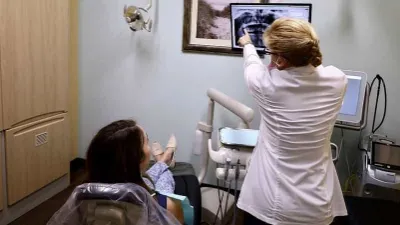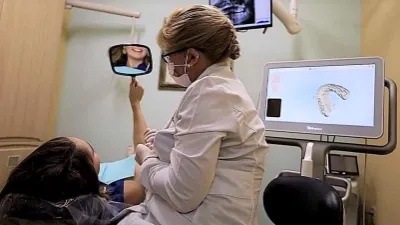Dental Sleep Medicine Doctor
Lakewood Ranch Dental Sleep Medicine Dentist Allison O'Brien, DMD
What is dental sleep medicine?
Dental sleep medicine is a branch of dentistry that focuses on the diagnosis and treatment of sleep-related breathing disorders, particularly sleep apnea. Sleep apnea is a common and serious sleep disorder where breathing repeatedly stops and starts during sleep. It can lead to various health issues, including cardiovascular problems, daytime fatigue, and impaired cognitive function.
Dentists who specialize in sleep dentistry work in collaboration with physicians and other healthcare professionals to address sleep-related breathing disorders, often through the use of oral appliances. These devices are designed to reposition the jaw and tongue to help keep the airway open during sleep, reducing the occurrence of apneas (breathing pauses) and improving overall sleep quality.
The role of dental professionals in managing sleep disorders has become increasingly recognized as part of a multidisciplinary approach to treating sleep apnea. In some cases, oral appliances may be recommended as an alternative or adjunct treatment to continuous positive airway pressure (CPAP) therapy, which is a common medical intervention for sleep apnea.
Dental sleep medicine also involves evaluating the oral and craniofacial structures that may contribute to airway obstruction during sleep. Dentists in this field may work closely with sleep medicine physicians, sleep centers, and other healthcare providers to provide comprehensive care for individuals with sleep-related breathing disorders.


Who performs dental sleep medicine?
Sleep dentistry work is typically performed by dentists who have received specialized training in the diagnosis and treatment of sleep-related breathing disorders, such as sleep apnea. These dentists may be referred to as sleep dentistry work practitioners or specialists. They work in collaboration with physicians and other healthcare professionals as part of a multidisciplinary approach to managing sleep disorders.
Dentists specializing in dental sleep medicine undergo additional education and training beyond their general dental education to understand the complexities of sleep-related breathing disorders, the anatomy of the airway, and the use of oral appliances for treatment. They may also work closely with sleep medicine physicians, pulmonologists, otolaryngologists (ear, nose, and throat specialists), and other healthcare providers to ensure comprehensive care for individuals with sleep apnea.
Patients who suspect they have a sleep-related breathing disorder, such as sleep apnea, often undergo a sleep study (polysomnography) to diagnose the condition. If diagnosed, a leep dentistry practitioner may be involved in the management of the disorder, particularly in prescribing and fitting oral appliances designed to alleviate symptoms.
It's important to note that the involvement of dentists in sleep dentistry is part of a collaborative effort with other healthcare professionals, and treatment decisions are often made in consultation with physicians who specialize in sleep medicine.
Dentists with specialized training in sleep dentistry are often the primary healthcare professionals involved in the diagnosis and treatment of sleep-related breathing disorders, such as sleep apnea. These dentists may be referred to as sleep medicine practitioners or specialists. They have expertise in assessing the oral and craniofacial structures that may contribute to airway obstruction during sleep and in prescribing and fitting oral appliances to address these issues.
Sleep Apnea
Sleep apnea is a sleep disorder characterized by repeated interruptions in breathing during sleep. These pauses in breathing, known as apneas, can last for seconds to minutes and can occur multiple times per hour. The most common types of sleep apnea are obstructive sleep apnea (OSA), central sleep apnea (CSA), and complex sleep apnea syndrome (previously known as mixed or treatment-emergent sleep apnea).
- Obstructive Sleep Apnea (OSA), the most prevalent form of sleep apnea and occurs when the muscles in the throat relax excessively during sleep, causing a partial or complete blockage of the upper airway. Symptoms may include loud snoring, gasping or choking during sleep, restless sleep, excessive daytime sleepiness, difficulty concentrating, and irritability. Risk factors for OSA include obesity, older age, male gender, family history, smoking, alcohol use, and certain anatomical factors.
- Central Sleep Apnea (CSA), less common and occurs when the brain fails to send the appropriate signals to the muscles to initiate breathing. Similar to OSA, CSA can result in disrupted sleep, daytime sleepiness, and difficulty concentrating. CSA is often associated with certain medical conditions such as heart failure, stroke, and conditions affecting the central nervous system.
- Complex Sleep Apnea Syndrome (CSAS), also known as treatment-emergent or mixed sleep apnea, CSAS occurs when an individual initially diagnosed with OSA develops central sleep apnea when using continuous positive airway pressure (CPAP) therapy for OSA. Managing CSAS may involve a combination of therapies used for OSA and CSA.
Sleep apnea is a serious condition that can have significant health consequences if left untreated. It may contribute to cardiovascular problems, hypertension, diabetes, and impaired cognitive function. Diagnosis often involves a sleep study (polysomnography), and treatment options vary depending on the severity and type of sleep apnea but may include lifestyle changes, continuous positive airway pressure (CPAP) therapy, oral appliances, or, in severe cases, surgery.
Dr. Allison O'Brien
As a member of the American Academy for Oral and Systemic Health (AAOSH) and the Integrative Dental Medicine Scholar Society (IDMSS), Dr. Allison O'Brien, DMD, has taken numerous hours of continuing education and has been helping patients with Sleep Disordered Breathing (SDB).
Since 2016, Dr. O'Brien has treated dozens of patients with Sleep Disordered Breathing symptoms, implementing protocols to more actively identify and treat patients.
Depending on the diagnosis, we may collaborate with myofunctional therapists, oral surgeons, orthodontists, and/or ENTs.